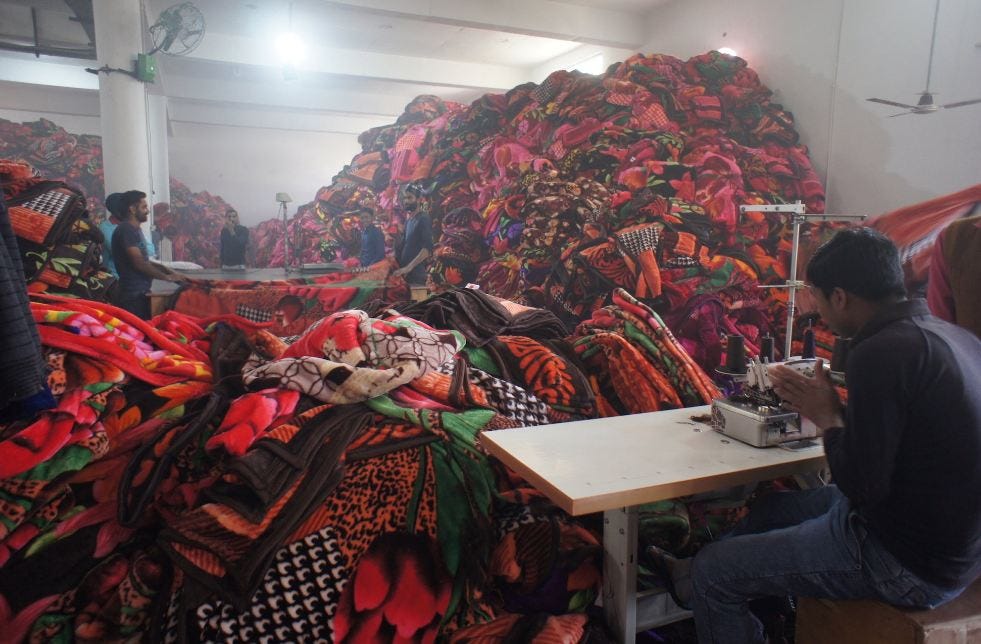Panipat: Redefining textile industry through sustainable innovation

Panipat, historically known for its rich textile heritage, is now at the forefront of a revolution—one that is redefining the future of sustainable textile production. Traditionally recognized as India’s ‘Textile City’, Panipat has transformed into a global leader in textile recycling, breathing new life into discarded fabrics and repurposing them into high-quality yarns and fibers. As the world faces a growing textile waste crisis, Panipat’s innovation-driven ecosystem is providing sustainable solutions that not only mitigate environmental damage but also present new economic opportunities.
The growing crisis
The global textile industry is one of the largest contributors to environmental degradation. According to the Ellen MacArthur Foundation, less than 1 per cent of textiles are recycled into new clothing, leading to an annual economic loss exceeding $100 billion. The fashion industry is also responsible for nearly 8 per cent of global greenhouse gas emissions.
India, a major textile producer, faces its own set of challenges. The Central Pollution Control Board (CPCB) estimates that millions of tonnes of textile waste are generated each year, a significant portion of which ends up in landfills or is incinerated, releasing harmful pollutants into the environment. As fast fashion and consumer demand continue to rise, the need for effective textile waste management has never been more urgent.
Yet, within this challenge lies an immense opportunity. The global recycled textile market is expected to grow rapidly, with the recycled polyester fiber segment alone valued at $6.7 billion in 2022, projected to grow at a CAGR of 6.2 per cent through 2030. With its well-established textile infrastructure and skilled workforce, Panipat is uniquely positioned to capitalize on this opportunity and lead the charge toward a more sustainable future.
Panipat in the forefront of textile recycling
Panipat’s ability to turn textile waste into high-value recycled fibers stems from its decades-long expertise in textile manufacturing, combined with its strategic location and extensive network of micro, small, and medium enterprises (MSMEs). The city processes 250 tonnes of textile waste per day, with an annual industry turnover exceeding Rs 50,000 crore (approximately $6.02 billion). Additionally, Panipat's export turnover stands at Rs 12,000 crore ($1.44 billion), underscoring its global relevance.
More than 2,000 registered textile units operate in Panipat, employing 8 to 10 lakh (800,000 to 1 million) workers directly and indirectly. These businesses have evolved beyond traditional weaving to embrace cutting-edge recycling technologies, sustainable yarn production, and advanced waste management solutions.
Innovations driving Panipat’s textile revolution
Waste management as a service: Panipat’s businesses are not just recycling textiles; they are pioneering comprehensive waste management services. Some companies specialize in processing hard-to-recycle textiles, such as national flags, demonstrating their commitment to responsible disposal and circular economy principles.
Advancements in sorting technology: Efficient sorting is one of the most crucial aspects of textile recycling. While manual sorting remains a key process, many Panipat-based businesses have adopted cutting-edge technology such as Near-Infrared (NIR) scanners and UV-based conveyor systems. These technologies enable faster and more precise sorting of fabric blends, making it easier to extract usable fibers for high-quality yarn production.
Producing high-quality yarn for global markets: One of the most notable shifts in Panipat’s textile industry is the move toward finer count yarns (NE 10s and above). These high-quality yarns cater to premium markets, allowing manufacturers to supply to international buyers looking for refined and sustainable textile solutions.
Vertical integration & research investments: Many Panipat-based firms are adopting vertical integration—controlling the entire production process from waste collection to finished yarn production. This model ensures higher quality control and allows companies to experiment with new fiber blends. Significant investments in R&D are also driving the production of finer yarns, expanding product offerings, and enhancing sustainability standards.
Sustainability certifications driving credibility: As sustainability becomes a top priority for global brands, Panipat’s textile firms are securing internationally recognized certifications such as: GRS (Global Recycled Standard); GOTS (Global Organic Textile Standard); OEKO-TEX (International Textile Safety Standard); ISO 9000 (Quality Management Certification). These certifications not only validate the industry’s commitment to eco-friendly practices but also boost its credibility among international buyers looking for certified sustainable products.
Transforming plastic into fabric: The push for sustainability has led Panipat’s manufacturers to explore innovative materials beyond traditional fabric waste. Companies like KS Spinning recycle over 60 million PET bottles per year to create polyester blends, significantly reducing reliance on virgin polyester. This practice aligns with global sustainability goals and reinforces Panipat’s role as a leader in circular fashion.
Challenges facing textile recycling industry
Despite its successes, Panipat’s textile recycling industry faces several challenges. MSMEs often struggle to secure funding for technological upgrades and advanced machinery. Also, the availability and quality of textile waste fluctuate, affecting production consistency. Increasing global competition is also a challenge with countries like China and Bangladesh increasing their recycled textile industries, intensifying competition. And many brands still produce clothing with complex blends and mixed fibers, making them difficult to recycle. Panipat’s future growth depends on greater collaboration between manufacturers and fashion brands to design recyclable products.
Therefore, Panipat’s journey from a traditional weaving hub to a cutting-edge center for textile recycling is a testament to the power of innovation and sustainability. By embracing circular economy principles, investing in technology, and meeting global certification standards, Panipat is not only securing its own economic future but also shaping the future of sustainable textiles worldwide.
